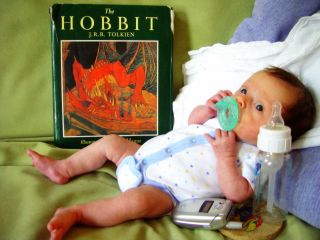Fascinating truths can emerge when you contrast parallel lives, a fact that historians often exploit. But anyone can do it.
For instance, you could look at David and Saul. You’d see two kings of Israel whose lives overlapped, and who both racked up impressive lists of crimes and misdemeanors. You find two outlaws, one of whom turns out to be “a man after God’s own heart.” The difference? When confronted with the evidence of personal evil, one man repented and the other aimed to save face.
David was a murderer and sexual offender, and his dissolute parenting tore his family apart. Nevertheless, his deep contrition put him on the ins with God. We are left to conclude, somewhat shockingly, that curtailing your crime quota is not necessarily the sure path to intimacy with God.
This realization corresponds to a discovery that the existentialist philosopher Soren Kierkegaard made, and was somewhat alarmed by. A close reader of the Bible, Kierkegaard detected a spiritual logic at work, a divine rationale, which he identified as the “religious.” Well and good. But this “religious” dimension was a law unto itself—and a mysterious law at that.
In Kierkegaard’s language, the “religious” standard transcends the merely “ethical”—because it leads one to God. Thus, when God commanded Abraham to kill his son, Isaac, Abraham was right in his willingness to obey (see Genesis 22). Ethical law gave way to religious obedience—and Abraham’s acquiescence paved the way for God to dramatically reveal his care and mercy (and to, in a sense, acquit himself of murder).
In a scandalous turn of events, Abraham’s willingness to obey God, at the apparent cost of homicide, became a revelatory master stroke. And if Abraham had "taken the ethical stance?" Not only would he have been guilty of divine defiance, he would have missed the miraculous appearance of God himself.
A similar law is at work in the life of David, where we see the ethical upended, transcended, trumped, by the religious. Apparently, a little contrition covers a lot of crime. Or so it appears to us. I've often thought something like this: Just look at what David was able to “get away with!”—only to have his accounts settled by timely repentance.
Probably, something similar would be the obvious plan—sin wantonly, repent strategically—except that it doesn’t work. And despite appearances, this isn’t what David did.
Repeated, deliberate sin dries up any impulse I have toward contrition. This is why the repent-on-demand lifestyle is absolutely impossible; impossible for David and for all the rest of us. The addiction that momentarily sates me kills the grace that would save me: Only a person who authentically loves God can repent, and habitual sin destroys my love for Christ.
A cursory look at David and Saul reveals two men who were highly aware of the ethical demands that kingship entailed, yet repeatedly trampled on their most sacred obligations. In return, God confronted them, and in those moments of divine encounter, a paradox was at work: Lawbreaking brought David and Saul up to the very threshold of intimacy with God, because God himself took them to task.
At the moment of encounter, David’s love for God brought him into a new sphere of friendship and liberation. His repentance ushered in the mysterious logic of “the religious,” and God embraced David as his child. Saul was a different story. Confronted with lethal offenses, he offered pragmatic rebuttals, indifferent excuses, anything to keep his image intact. Drawn to the very doorway of grace, Saul stumbled back into the merely “ethical” life—and could not even succeed in this. None of us really can.
But by the same token, we all receive the same opportunity as David. He saw what we all must eventually see, that ethics are intended to point us to grace. Our stumbling is inevitable, but God turns it to his purposes. Arrogance and addiction throw us on God’s doorstep, where the mystery of the “religious” awaits. We are offered forgiveness, grace. But a self-justifying person will not recognize divine beauty when it is unveiled.
Wednesday, May 31, 2006
Repentance Better Than Ethics: A Look at David & Saul
Posted by
AJ
at
11:04 PM
3
comments
![]()
Monday, May 29, 2006
Alone with God

In a very real way, becoming a Christian makes you more alone.
I think that we are like stars in the night sky. All around is darkness; the unfailing backdrop of our lives is this relational distance. True, we can fight it. We can even partially bridge it, but never completely, so that we are fully known. In the end, only Christ can surmount it. But at first, he removes the comforting glare of the streetlights and we are plunged into night.
We discover that the societal "warmth" and "light" that we enjoy are, at best, poor replacements for real warmth and light. What I’m saying is, we gain Christ, but we lose the world, and the comfortable illusions of intimacy that go with it.
Before Jesus enters the scene, we go through life in a careless haze, and then Christ’s light blazes up—an otherworldly light—and we come face to face with our selfishness, and realize that evil has grown deep roots. The light is brilliant and very beautiful, but the self-realization is frightening. The human heart has depths no one can plumb. No mere human, anyway.
No one can speak to this heart-reality but Christ. But when he does, we begin to see how addicted and deceived and wrongheaded and, yes—how evil—we have been. We stand awkwardly and feel Christ’s searchlight on our souls.
We feel him calling us, drawing us out of our Godforsaken solitude, into a set-apart relationship with himself. This believing, this leaving of the old, is a drastically individual act. We discover a new dimension of self-awareness: a consciousness of ourselves in relation to God. The surface illusions of deep connectedness with culture, with fads, with self-serving relationships, are scrubbed away, and we find ourselves in a new paradox: alone with God.
But this redeeming friendship is not allowed to grow up in isolation. Ironically, while we answered Christ’s call alone, as individuals, we are not permitted to keep following him this way. We utter individuals are called into radical community.
It is called “the church,” and it is frightening and fundamentally good. As lone stars, we seem to strike sparks when we approach each other—but Jesus calls us to do just that. Get near to the others and stay there, no pulling away. This kind of proximity brings back to us, at first, the initial fear that we experienced when Christ’s searchlight began scanning our heart’s dark closets. To be this close to God’s people is to be exposed.
Nevertheless, we begin to grow in the unfading light of this exposure. And the growth, because it is tested by the jostling and querying of the church, is real. In community, we minister to (and emphasize) our own individuality, but the pain of loneliness begins to be washed away. We are stars, learning to be the milky way.
And above us, around us, and through us all, flows the energy of a transforming fire more powerful than any sun.
Posted by
AJ
at
12:48 PM
8
comments
![]()
Sunday, May 28, 2006
Christian T-Shirts Make Excellent Cleaning Rags
For some time now, I've been intending to write a post deprecating the stereotypical, mind-boggling "Christian T-Shirt." Now, thanks to Zach Nielsen, I don't need to. So, in this order:
- Check out Zach's thoughtful "Christian T-Shirt" post.
- If necessary, rummage through your closet and remove offending items.
- Convert them to cleaning rags, fast.
Posted by
AJ
at
7:34 PM
6
comments
![]()
Saturday, May 27, 2006
Two Candles on the Blog

For the second time in my life, I’ve reached that part of the year generally recognized as the anniversary of BitterSweetLife. I think.
In 2005, I admitted sheepishly that, due to some random “playing with” Blogger’s time/date function, the precise moment of my first post here has been lost. But sentimentality triumphs over exactitude with these things.
The central idea is that BitterSweetLife has beat the odds and survived, maintaining something like self-respect, to reach a two-year birthday. Technorati released some “state of the blogosphere” stats several weeks ago that revealed the type of attrition that new bloggers are prone to. Consider:
- The blogosphere doubles in size every six months.
- It’s now 60 times bigger than it was three years ago.
- A new blog is launched every second of every day.
- 19.4 million bloggers (55%) are still posting 3 months after their blogs are created.
The final stat is revealing for what it doesn’t say: If half of all new bloggers die after three months, how many survive six months? Or a year? We can only guess.
Therefore, it’s with considerable satisfaction that BitterSweetLife emerges as a two-year-old. Technorati doesn’t provide the stats, but we like to think that we are at least one in a million.
The last couple years have seen this blog evolve from a photoblog to a provider of brief spiritual vignettes and on to its current status: a site exploring the bittersweet spiritual journey toward Christ, with unabashed tendencies toward hoops, books, coffee, trash talk, and Blogger hacks. The goal, which incorporates Jayhawk basketball posts, "Master" book reviews, and all things "bittersweet," is incisive language and realistic takes that reflect an authentic knowing of Jesus.
The look or style here may change, but that last phrase is set in stone. BitterSweetLife is ready to rock and write and roll because Jesus is ahead. The journey is on and we're not dropping out. Grrr.
Posted by
AJ
at
2:34 PM
7
comments
![]()
Friday, May 26, 2006
Weekend Photo: Sky in Brick

It's not as if I never post photos around here. But recently, inspired by talents like Joe Thorn and Steve McCoy, I've hit upon yet another excuse to slam up photography: something along the lines of a "Friday photo." From here on out (assuming I can get to it in time - at this moment it's only "Friday" in the technical sense) you can look for a free-standing shot on Fridays (commentary optional).
This view is just out the back door from our downtown, Kansas City loft apartment. When we get cloudy days around here, I often find myself rushing outside to capture the strangely transcendent urban setting.
Posted by
AJ
at
11:06 PM
4
comments
![]()
Thursday, May 25, 2006
A Certain Justice - P.D. James, A
A Flash Review: Dark Psyches and Philosophical Weight
A Certain Justice – P.D. James, A
There can be no doubt that James gets better with age.
Justice is James' tenth Adam Dalgliesh story, and it would make a convincing screenplay in the serial killer genre: the narrative is seamless, woven with supreme pacing, and James’ villain is the darkest antagonist I’ve encountered in recent years. But despite the precisely punctuated action, and the dread which James evokes without resorting to cheap scares, the greatest achievement of this book is on another plane altogether.
James adeptly weaves philosophical and theological foundations into her story, so that when the final pages turn, not only does the jaw drop—the mind jumps as well. Is life really this way? James makes a disconcertingly bittersweet observation about earthly justice that will leave you rereading the book’s title, experimentally varying your inflection.
On the character level, while James continues to explore the psychology of an aging Dalgliesh, she also focuses on the interplay of his supporting cast, expertly zooming in for close-ups that make the later novels tantalizing.
::
Listed on the Master Book List.
Posted by
AJ
at
8:39 PM
2
comments
![]()
Wednesday, May 24, 2006
Broken Light
A Meditation on Restoration
There is something melancholy about the way that light leaves.
Most of us have felt it in the setting sun. When the rays slip past, you cannot call them back. Once they hit the retina, they are gone. Light is absorbed or refracted, and then the shards leap away and are gone forever. Light and Time; they are both this way: in their true forms, they exist infinitely—but we encounter them only in scarcity. We are not strong enough to catch and follow, step into their stream and ride them to their source.
This is why broken light is sad. The dying sun is a little like a setting life, representing something invaluable that should not end, but does.
Therefore, there is a sense in which a man who could fix a broken light could mend the world. And I’m happy to say that ‘man’ is Jesus Christ.
Posted by
AJ
at
8:16 PM
2
comments
![]()
Tuesday, May 23, 2006
The Blog Lands a Shoe Deal
A few of you may remember the book deal and CD deal that this blog was lucky enough to pull down. And of course, the famed coffee deal. Well, further history has been made—and no one was more surprised then I was—when BitterSweetLife acquired its first shoe deal.
It began when an up-and-coming PR-type person sent me a note and pleaded with me to display a “One on One” promotional ad on my site, featuring NBA youngster Carmelo Anthony. He had been drawn to BitterSweetLife by the hoops vibe and swank authenticity that this blog cultivates.
At first I was reluctant, since Jayhawk fans will never forget how KU lost the NCAA title game to Anthony’s Syracuse team in 2003. But then, you can’t blame a player for being good. My love for hoops overwhelmed me, and I caved in.
But not before the PR guy offered me the shoe deal. “Look,” he typed. “Please, PLEASE, put up this ad. My kids are starving, my car is up on blocks, my job is on the rocks. I need the prestige and legitimacy that only a place on your blog can grant me.”
“And?” I typed.
“Well, I’ll send you some Carmelo gear too.”
“Then we have a deal.”
And we did. Yesterday my certified, autographed “gear” arrived in the mail. Check out the shiny new kick:
If you simply have to have it, to hang in your trophy room, send me a note. No doubt an agreement can be reached.
But for now, The Shoe Deal resides in our apartment, glowing in all its white suede glory.
What more can I expect? A house deal? A job deal?
Nothing will surprise me now.
Posted by
AJ
at
3:59 PM
7
comments
![]()
Monday, May 22, 2006
Forgiveness: Over a Cross to Freedom

I think we can agree on this: the fabric of life is injurious, like a medieval hair shirt; it’s woven with offenses. The earth is teeming with human life—we rub elbows, we butt heads, and where we make contact we leave bruises.
No matter who you are, the world has an abrasive relationship waiting for you, made to suit. Not even the most sincere and helpful people are exempt, and in fact, if you take a cursory look at history, you come to suspect they are especially susceptible. For example:
Jesus’ disciples felt the injustice of this state of things acutely. They understood that most people, and maybe even themselves, were jerks. However, wanting to go along with Christ’s new formula, they expressed a willingness to make concessions.
Peter was the spokesperson for their peacemaking effort. He asked Jesus how many times a generous, self-respecting man could be expected to forgive his antagonists, and then quickly answered his own question:
Peter would forgive and forgive and forgive—up to seven times, at least. (After that, the brass knuckles would come out.)
What spiritual guru could resist such an offer?
Unfortunately for Peter and the boys, Jesus was not just another spiritual guru. He turned Peter’s proposal on its head when he made a counter-offer: Seven times? How about seventy times seven? The disciples were not fooled by the math (490 times, and after that bitterness is in the clear). Jesus was saying, in essence, Forgiveness has no statute of limitations.
The disciples’ chagrin at this point was understandable. (Peter unobtrusively and reluctantly dropped his baseball bat in the ditch.)
Only later, persecuted, berated, executed, would the disciples learn the freedom that Christ had displayed in the face of an antagonistic world. Forgiveness was the ultimate rebuttal of earth’s viciousness, a refutation for which there was no answer.
The disciples came to know this well because Christ forgave them all—repeatedly and without conditions. He had forgiven Peter the overweening pride and stray dog selfishness that had led him to officiously question Jesus’ judgment and then later deny their friendship altogether. Peter was the stand-in rep for all the disciples and, indeed, the whole world in this: Jesus forgave him when he broke the Savior’s heart.
But the discharging of debts didn’t end there. Christ had pardoned the “personal” insults, yes. But then he had died, execution-style, in the manner that Romans reserved for their most despised criminals. All the disciples ran like rabbits. And then came the unfathomable twist. A miracle of freedom rising from a miasma of guilt, of divine fire ascending from dead ashes, a wonder greater than the Grecian phoenix.
Jesus came back and he forgave them all.
When Christ walked out his grave, alive, the disciples understood at last: “personal” sins were never merely personal. It was God who kept the books. But it was also God who had acquitted them. He had absolved his friends of every moral charge laid at their feet. This was heavenly forgiveness: Jesus had suffered for them, taking on the deserved death of humankind. He had taken on the pain of sin, the conclusion of God’s inevitable justice—and they were no longer culpable.
How different their lives would have been if Christ had not been the forgiving kind. In light of his example, how could they do otherwise?
Peter, a tempestuous man, must have been familiar with the depreciating value of a grudge indulged. The satisfaction derived from such bitterness shrinks, and so does the person who carries it. Peter must have learned that when bitterness locks an offender in an emotional abyss, part of the captor goes inside as well.
It’s a testimony to the otherworldly quality of Christ’s kingdom that his answer to a world of perpetual offense is a spirit of infinite forgiveness—and a killing cross to make the bargain good.
No mere man would suggest such transforming madness.
Inspired by a message from John Vanderhorst, "Step into air and sunshine," 5.21.06.
Posted by
AJ
at
1:38 PM
1 comments
![]()
Saturday, May 20, 2006
Life a Spiritual Journey (Why Augustine Would Like This Blog)

Some time ago, when I was learning about Saint Augustine, I was pleased to discover that one of the dominant metaphors he developed was that of life as a journey—a spiritual journey. Augustine saw our being as a spiritual trek that brought Christ’s followers nearer and nearer to their patriq, their homeland. This native country, never fully reached in this life, was God the Father.
As much as I revere the penetrating depth of Augustine’s thought, this was not merely his “good idea.” Refreshingly, Augustine drew out the journey language that is so prevalent in the Bible, and emphasized it as a central theme for a people who can truthfully said to be “on the way.”
This metaphor is provocative in nature, because Augustine argued that all people, not merely those who knew Christ, were on a journey. Life is linear, he pointed out, and we move forward deliberately and with purpose. At all times, though with varying degrees of self-awareness, we are progressing steadily toward something.
Our travels take their course under the eyes of God, who is the axis, the very heart of reality. God gives meaning to existence, Augustine would say, in that what he blesses, IS—and continues to be. All being is of God. Everything else, including the temporary devastations of evil, can be said to be passing away.
Therefore, we all spend our lives on the road. We advance toward the homeland, or we resist; we stride toward the patriq or a darker country. We move toward an ending.
Some, pricked by divine discontent, will sell off their “assets” in order to make their way down the road. In the distance, they sense the shining presence of the ultimate reality into which they are journeying: the very City of God.
Life is a spiritual journey. Sometimes the truth transcends the metaphor. In this case, I try to keep the "journey" analogy in front of me as a trail sign for this life, not to mention this blog.
Posted by
AJ
at
5:48 PM
9
comments
![]()
Friday, May 19, 2006
coComment: Trans-Blog Conversations
Another Excursion Into Cool Technology
For some people, the blogosphere is a silent pleasure. Others enjoy it more when they talk about it.
If you’re in the latter category (or want to be), and tend to make comments on a regular basis, coComment is for you. I ran into this blogging accessory earlier this week, and after several days of use, I’m impressed and ready to recommend it.
The purpose of coComment is to collect all your comments in one place, no matter what blog you make them on. This makes it easy to track conversations and return to them. coComment’s functionality is attractive (you can tag your comments), the interface is simple, and the price is right: free.
If you’re curious to see coComment in action, you might want to click over to my coComment page, and get an idea of how the site works.
As with most of the hacks and add-ons I use, Firefox is highly recommended, and provides extra ease of use:
If you do take a look at coComment, let me know what you think. Tech update complete.
Posted by
AJ
at
5:24 PM
5
comments
![]()
Thursday, May 18, 2006
Hot Links

In the last few days, my mind has acquired that colorless quality that a rubber band gets when you stretch it too far. My mind is still a mind, but it has been utilized so ruthlessly that its elasticity has been compromised. Having just completed my final final, I’m now hoping my mind will rebound like saltwater taffy—the kind that gets stronger and more resilient the more it is yanked on.
That’s beside the point, though.
In the interests of taking a mental break, I’m linking to a few excellent posts I’ve read in the last couple days. Go get ‘em.
Emergent Enemies of Doctrine Affirmed - Sort of
Don't let the title mislead you; this treatment of "doctrine," and how it has fallen on hard times, is incisive and fascinating. Funny too.
The New and Improved Bible
This brilliant post outlines a plan for-- Well, the title says it all. Spectacular satire.
Review: Confessions of a Reformission by Mark Driscoll
This assessment by iMonk is an attention grabber, all the more so because I'll be listening to Mark Driscoll live at the DG conference I mentioned earlier. It would be an understatement to say this review whet my appetite.
Posted by
AJ
at
2:51 PM
0
comments
![]()
British BitterSweetLife Readers
As something of a C.S. Lewis acolyte, I admit that I get unduly excited (some would say) when I notice visitors to this blog who hail from England. In recent days, visitors from London, Sheffield and Oxford have trickled in. I get excited over these Brits, and especially the one who checks this blog from…
Oxford.
Since I’ve cultivated a lingering ambition to attend Oxford, the locale does a lot for morale. I like to pretend that Ravi Zacharias has stopped by and is checking in. At any rate, this Oxford reader is clearly a brilliant and discerning person with excellent taste in blogs.
All you Brits are very welcome. And feel free to invite your friends.
Posted by
AJ
at
2:21 PM
6
comments
![]()
Wednesday, May 17, 2006
The Soul as a City: Ruins or Reconstruction?

Earlier this year I had a picture of the soul as a ruined city, a city that God rebuilds. My theological metaphor ran like this:
Our souls lie in ruins, vulnerable to any and every enemy. Then Christ comes along and brings restoration. Nehemiah-like, he starts to rebuild the walls. Suddenly, resistance is an option.
We discover that we can fight against sin successfully, that we can defy our darker impulses. There is a means of defense. The circle of our “free will” is expanded to include something besides failure. Jesus rebuilds the ruins, brick by brick, and sets his Spirit to patrol the walls. Then he hands us the key, and says, “Be alert.”
The power of defense is all Christ’s. But the responsibility to keep the walls from being breached still lies with us.
I was fairly happy with the analogy. But more recently I developed a variant on the picture.
I’m standing inside my own soul, and it’s not what you’d call a construction site. Things are coming down, not going up. I jump to one side to avoid a wall that comes crashing down, only to narrowly evade death at the prongs of a falling chandelier. The air is thick with drywall dust and plaster crunches underfoot. While the destruction is magnificent, I’ve got to wonder what will be left when all of this is over.
I’ve asked a similar question before. After all the so-called ‘work’ put in on my soul, will the final job be restoration or demolition? Seems like so much still ‘has to go’ that God may need to raze everything to the ground and get a clean start.
If that’s really necessary, what would be left? If the soul is a house, and you demolish it, what happens to things like personality? Maybe you retain the charm of an old, English hillside where a castle once stood. An aura of strength and adventure seeps out of the grass, where the remains of towering walls can be seen if you look closely. That ruined fortress could be my soul, after every seamy vein has been worked out of the rock.
Or not.
My love for the dramatic sometimes gets the better of me. The picture I find in the Bible is one of gradual, steady change—maybe not much, but change, nonetheless. And for the better. That means that God is at work in my life in subtle ways, and that he may be more aware of the progress than I am. I suppose this really is true. I just think, “God, I’m not giving you much to work with. Where are the materials coming from?”
I realize the pointlessness of the question as soon as I ask it.
Posted by
AJ
at
5:06 PM
3
comments
![]()
Tuesday, May 16, 2006
Reading for Sanity
Reaching the Dalgliesh Point
It happens every semester. I enter a phase of endgame desperation and begin to read—frivolously and irresponsibly. (In the past, I’ve labeled this extremity the “Dalgliesh Point,” tipping my hat to the P.D. James mysteries that typically keep me sane.) Theoretically, this rabid course of action should sound the death knell for my final exams. But things are not always as they seem. In reality, it gives me the mental wherewithal to cram my finals down.
I’m not sure what possessed me, but in the last several days I traversed rapidly through The Land That Time Forgot by Edgar Rice Burroughs. What can I say about Burroughs? He won’t make the Master Book List, but he does have a knack for the fantastic. I guess his work could be classified as Victorian pulp fiction. I place Burroughs in the same psychological realm as Frank Baum and Lewis Carroll, all of whom must have spent their waking hours in prolonged daydreams.
In Burrough’s case (as anyone who’s read Tarzan can say), the daydreams are filled with exotic environs and “savage” women. This could rightly be called unabashed escapism, so I guess it’s appropriate that I’m reading it during my finals week. However, with literature of this sort, “a spoonful weighs a ton”—which is to say I’m probably set for at least ten years.
This morning I took the meds to soothe my aching back, drank the coffee to stir my tired mind, sipped the water to fill my dehydrated veins, and headed off to slam up my Theology 2 exam. What happened next was an information dump. I unloaded everything in my mind, emptying even the hallway closets. My pieces of notepaper got so weighed down with theology that they curled up like hard tacos as I wrote. The information is laid on so thick my professor will have to grade it with a spatula.
Now that I’m back home, and before cramming begins for my History of Christianity exam, I’ve opened P.D. James’s A Certain Justice starring Adam Dalgliesh. In the initial excitement, 1.5 chapters have been devoured, and—as countless previous experiences have taught me—the darkly intricate world of P.D. James is the perfect antidote to Finals.
As I type, Burrough’s dinosaurs and jungle princesses are receding and present-day London is taking on focus. I already feel better. Now, in truth, the Dalgliesh Point has been reached.
Posted by
AJ
at
7:09 PM
2
comments
![]()
Changing the World from Within

I’m not convinced that the world ever changes much. That’s not to say that a piece of helpful legislation never gets passed, or that corrupt regimes never get upended. As history has shown us, they sometimes do—but anarchic people and oppressive governments are something we don’t escape. The world, you see, doesn’t change much.
Nevertheless, something changes about the world. Our relationship to this earth is in a state of flux. Reality is a picture with an increasing pixel count. Existence gains high resolution. Realism becomes a way of life, and it is brighter, not darker, than what previously passed for perception.
I almost hate to say what I’m about to say because it will sound dangerously like designer spirituality—the stuff which aims for sentimentality without actuality. Only the fact that I have Paul (who wrote about “seeing through a glass dimly”) in my corner, as well as Jesus (the self-proclaimed “light of the world”), gives me the nerve to push on.
The world doesn’t change much. And, while I know (and aggressively assert) that we grow some, I’m not convinced that people change drastically either. (Note my emphasis on “drastically.”) But something about us changes. There is this thing called variously “getting mature” or “gaining experience” or “finding wisdom.” So what gives?
I like to think of the subtle “change” I experience as sleep gradually giving way to consciousness—and not the drugged, irritable wakefulness that follows a too-short nap, but the kind that caps a long, refreshing dream. This is a sleep that gives way to a dawn of unexpected promise.
Anatomically speaking, for me this is not always the case. In my sleep, my body stealthily moves into contorted positions which were comfortable in my earlier life but that now spell disaster for my vertebrae. I wake up to pinched nerves and the realization that, during the dark hours, I can’t monitor my own health. I can’t even see myself to know what I am doing.
I can draw a parallel between my physical sleeping patterns and my spiritual development: maybe I will reach the point where I will stop hurting myself in my sleep. Will I gain new self-awareness? Will my spiritual stupor give way to a magical sunrise? Or perhaps, will one accompany the other?
I know that I “change” in this way, at least: Heaven’s light seeps through my eyelids and the world gradually takes on shape. The light gives life. I see my personalized addictions without the dubious benefit of obscuring shadow. I know where in the room they stand, and where I do. I no longer stub my toes.
I see that the world is broken, and I am too—but things are fresher, and more truth nevertheless: I see Christ through the cracks. I need him badly: Apparently I will be a child all my life.
The world hasn’t changed, but I see it more clearly. In a sense, then, I have changed too, because Christ has given me new eyes, and they are blinking. They are guessing at earth’s eternal shadows. In the end they will be fully open.
::
Things I did not say:
It’s not worth reading the news.
Voting is unimportant.
Who needs social justice?
People are hopelessly evil.
Don’t bother trying to grow more mature.
I have all this figured out.
Posted by
AJ
at
10:22 AM
6
comments
![]()
Monday, May 15, 2006
Fighting Final Exams
Finals Week has arrived.
I’m currently battling it out with a formidable set of notes from Theology 2 for my exam tomorrow. Due to a variety of circumstances of last week, most of which involved Aidan, I wasn’t able to get started on my test prep until this morning. I know the exam will cover one of two topics:
Four Views of the AtonementorJustification by Grace through Faith
It’s a good thing these two topics are so clear cut and readily digestible. Actually, they are—and this fact should provoke gratitude, since Christianity does not posit arcane, supremely obscure doctrines at the center of faith. Paradox, yes. Mystery, even—yes! But no flat contradictions, no esoteric abracadabra.
I wish I could say the same thing about my notes.
Posted by
AJ
at
3:50 PM
3
comments
![]()
Sunday, May 14, 2006
Aidan Speaks On Mother's Day

It’s not always easy to find a good time to talk with Aidan, because of his busy schedule. Fortunately, when you are lucky enough to catch him in a quiet moment, he usually speaks his mind.
My moment came last night when Aidan was lounging on the futon in his footed pajamas, sipping a decaf vanilla latte, and Lindsay and I had just breathed a big sigh of relief—wishing, at the same time, that we had footed pajamas too. I realized that now was as good a time as ever for an interview.
I shooed Lindsay out of the room, put in Aidan’s favorite Mozart CD, and began to ask questions.
“Hey Aidan, quick: What are some things you like about your Mom?”
At first, Aidan was reticent, as if he was unwilling to speak on the topic. I wondered why he seemed so quiet and bashful, but I quickly realized that it was the fear of sounding overly gushy and sentimental that made him hesitate to talk. I readily understood.
“Look,” I said, “If you get emotional and tear up or anything, I won’t publish that part of the interview. We both know how you feel about Mom.” Aidan looked at me carefully, to see if I was being sincere, and then agreed. The interview was on.
“Ok,” I said. “So what are some things you appreciate about Mom?”
“Well,” said Aidan. “Let me think. OK, I have one. I like how she appreciates my artwork.”
I sighed, because I’d had a feeling this would come up.
“What artwork, exactly?”
“Oh, you know, Dad.”
Indeed, I did know, but I persisted.
“Come on, just explain for the record.”
“Well, for example, my art of ‘being wakeful.’ I have put a great deal of time and energy into this. It is not easy to strike the perfect note between happy alertness and hyper-attentive despair. The genius, you know, is in the details. It’s all about how I whimper softly, and how I kick—not hard enough to wear myself out, but with just enough force to escape from the restraining blankets. I’ve always noticed that Mom pays close attention to my efforts in this field. She is very supportive. Much more than you are, actually.”
“This isn’t about me,” I reminded him. “What else?”
“Well, my Italian fountain imitation. Mom is always impressed by that.”
“She sure is.” Inwardly, I rolled my eyes.
“Also, Mom knows that an artist has more basic needs too. She arranges for my meals to be delivered, five or six times a day.”
“That’s right.”
“And she knows that I generally like to work while being held upright, bounced not shaken, in a sitting position. I’m very particular about that.”
“You sure are.”
“Mom is great.”
Just then, I heard the bedroom door open. Lindsay was coming back into the room! “No!” I said. “I’m not done with the interview yet!”
But it was too late. Lindsay was standing in the room, and Aidan had seen her. Overcome by emotion, he balled up his fists, kicked his feet, and burst into—Well, let’s just say he was deeply moved.
The interview had come to an end, but one thing, at least, was clear. Like small, temperamental artists everywhere, Aidan loves his mom.
Posted by
AJ
at
10:42 PM
2
comments
![]()
Saturday, May 13, 2006
Supremacy of Christ in a Postmodern World

Some of you may be interested in the Desiring God conference coming up September 29 - October 1. I definitely am. Keenly interested. The theme is Above All Earthly Powers: The Supremacy of Christ in a Postmodern World.
I’m not sure I’ve ever seen a collection of speakers this scintillating.
- David Wells?
- D.A. Carson?
- Timothy Keller?
- Mark Driscoll?
- Voddie Baucham?
- John Piper?
I'm not sure wild horses could drag me away from this conference.
Posted by
AJ
at
8:17 PM
3
comments
![]()
A Sip in Time Saves Mind

I had reached that pre-finals point in the semester, the point where my blood type becomes Coffee by majority vote. It was unfortunate that I had also reached the pre-collapse point where my coffee bean supply reaches the bottom of the jar. There were just days, hours—cups, shots—left before I would have to venture into the outside world and procure more of the life-giving beans.
So the importance of our friend Rebekah’s visit at this juncture can hardly be exaggerated.
Rebekah came to talk and hold Aidan, and because of the goodness of her heart and the far-seeing vision of her soul, she brought gifts. To Lindsay, Rebekah gave a box of Godiva chocolates. And to me and Aidan? That’s right: an entire bag of Roasterie 40 Sardines, a smooth local product blended to perfection.
Aidan and I were almost beside ourselves. And we definitely do not believe in coincidences.
Posted by
AJ
at
1:54 PM
6
comments
![]()
Thursday, May 11, 2006
Obedience to Christ: An Impossible Climb

If you are at all given to adventure, at some point in your life you have probably experienced a certain type of horrifying thrill. Usually, it happens in Colorado or Arizona or Wyoming. At a bare minimum, gigantic boulders are required and massive rock faces are preferable. The moment of terror happens like this:
You are climbing the rock face, hand over hand, scratching for holds with your fingers. You find one little crevice and then another. You put a foot up, or a knee up, or even an elbow, and push. You contort your body into a rigid, straining mass centered upon a 2-inch indentation in the granite. You activate muscles in your forearms and the backs of your hands that before were just limp spaghetti.
It's all fun and games until you reach the point of no return and realize, abruptly, that there is also no going on. You are stuck on a cliff, trapped on a slab of vertical rock. Your fingers desperately fan across the stone over your head, and find nothing. Your calves begin to quiver, wedged into a marginal "ledge" - all that separates you from a plunging fall. A technical climb has become a rescue op.
The horrible realization dawns: I will have to stay here for the rest of my life.
::
Becoming obedient to Christ is a lot like this. Frighteningly so. We are climbing a cliff, and getting higher and higher above the ground. Then, just when we thought we were progressing, we find that we are standing still in rock dust. Our sweat begins to dry and muscles cramp. We are stuck in an awful state of static sin. What we always used to do, we are doing, and apparently we will continue doing it. Addiction has cornered us, and the only road out is vertical.
What happens next is a paradox. It appears that if we are going to escape, we will have to play the central role in our own rescue. There is no one else nearby. No one, that is, except the one who inspired us to begin the mad climb in the first place.
We were so wound up, what with the climbing shoes, the chalk bag, the Oakley "climbing" glasses - that we forgot that the God of the impossible also asks us to do impossible things. That's why we're on this wall. The wall is called Obedience to Christ, and to say it's hard to beat is the ultimate understatement. Obedience is an insurmountable obstacle.
Clinging there, shaking, to the wall, we suddenly remember the impossibility of our reaching the top. Then, if our eyes are not too red, we remember something else. Christ commands us to do this impossible thing, but he also lives in us and does the work for us. Remembering that we are not alone, we pray to God, we ask for help. And the next time we reeeaaach for a hold, our scuffed and tired fingers find a grip. Could it have been there all along? New strength fills our arms. Is it really just adrenalin?
::
I think the fundamental disconnect comes when we forget that the cliff is where we always live. Obedience is always a desperate situation. We are constantly living in a state of moral emergency from which only Christ can extricate us. And awful things begin to happen when we make out as if obedience is merely a hobby.
When we remember that life in Christ is lived out on a cliff face, then we habitually drink deep of Jesus, the "fountain of life." Obeying him is never easy. But we become addicted to Christ instead of our sin. And once we have drunk deep of the living fountain, we may rightly say, surveying the hot rock wall, that there is something in the water.
Inspired by a message from John Vanderhorst: "Obedience - Scaling the Cliff," 5.7.06
Posted by
AJ
at
12:18 PM
11
comments
![]()
Wednesday, May 10, 2006
Resident Alien

I am not a huge milk fan at this point in my life, but occasionally I like a swig, especially after eating something sweet—like cheesecake. So it was that yesterday, as I walked past the kitchen counter, I swiped Lindsay’s glass of milk and absconded with it into the relative safety of the bedroom.
Despite my expertise in these things, Lindsay noticed me making my escape. She followed me to retrieve her cherished drink and made the following remark:
“I know what you’re doing! You’re taking my milk so I’ll come in here, like the kid does in E.T. with the Reese’s Pieces!”
“Honey—that analogy is perfect.”
Sometimes you get a set-up that is just unbelievable.
Posted by
AJ
at
10:10 PM
4
comments
![]()
Tuesday, May 09, 2006
God Sends Darrell Arthur to the Jayhawks
Another KU Jayhawk Recruiting Coup
Darrell Arthur was one of the top two or three post players in the 2006 high school class and the #16 player ranked nationally. He faked the media out repeatedly with statements about upcoming press conferences—which were delayed and canceled over and over. Darrell Arthur flirted with a host of big-time programs including Texas, Arizona, Indiana, and LSU—last year’s runner-up for the national championship. KU was on the list too, but never as the clear favorite.
Arthur strung his schools “of choice” along for as long as possible, confusing his friends, bewildering his family, and baffling all the sports pundits. But in the end he couldn’t resist the call of God.
As the Lawrence Journal World reports:
After experiencing a vivid dream, Arthur, who averaged 18 points, 10 rebounds and six blocked shots in leading South Oak Cliff to its second straight state title as a senior, rose to his feet with the memory of playing basketball in a Kansas University jersey.
"I prayed on it hard last night," Arthur said of his difficult decision. "It came to me in a dream. It was me playing in a game with a lot of the current players, Mario (Chalmers), Julian (Wright), everyone…"
Asked if he thought his early morning realization was divine intervention, Arthur said: "I think it was."
You should read the whole article, as it’s one of the more unusual recruiting wrap-ups you’ll find. Of course, here in Kansas Jayhawk country, we’re just thanking God.
As well, seldom has the natural connection between theology and hoops been more obvious. And now we can finally lay to rest the petty arguments about who God’s favorite college basketball team really is.
Posted by
AJ
at
4:42 PM
5
comments
![]()
Keepin' It Real

For about a month now, I’ve been even more in tune with the man on the street, even more deeply authentic in my lifestyle, even more dripping with street cred, than I typically am. How is this possible? you ask. Well, the answer involves broken glass and a lessened ability to drive with confidence.
It all began several weeks ago when an intoxicated weekend partygoer swaggered past our car and decided he needed to prove his audacity to the world by smashing off the driver’s side mirror. No doubt there was an admiring female somewhere in the picture. This, at least, is my working hypothesis. I have no way of confirming it, having been sound asleep at the time.
At any rate, the pictures reveal the outcome.
In the weeks since “the accident” I’ve transitioned from blind rage to controlled bitterness to a kind of cagey acceptance. While we wait for the insurance check, I am wearing my urban tattoo with pride. I am embracing this overt symbol of dysfunction. I am realer than I’ve ever been.
Posted by
AJ
at
3:52 PM
3
comments
![]()
Sunday, May 07, 2006
Gap Creek - Robert Morgan, A
Cold, Clean Water: A Flash Review
Gap Creek – Robert Morgan, A
Combining the gritty tone of Cold Mountain with the spiritual motif of Peace Like a River, Robert Morgan’s turn of the century novel is deceptively spare; Gap Creek leaves a clean, sweet aftertaste. His protagonist, Julie, speaks with an unassuming manner that would sound “postmodern” if stripped of its Appalachian mannerisms and placed in the 21st century.
Julie's blunt, uncompromisingly honest voice is the vehicle through which Morgan conveys a surprising depth of psychological realism—and does so with little more than a high school vocabulary (today's high school, that is). Hemingway’s stripped-down approach came to mind, but the comparison fails, because Morgan lacks Hemingway’s deliberately experimental crudity of speech and his jaded edginess.
Nevertheless, Morgan’s writing falls into the school of less is more; while not overly dark, his language is stark and minimal. His work has the added appeal of sustained surprise—I found myself pigeonholing characters and plot devices, only to be proven wrong. Gap Creek depicts poverty, loss, pain, and love—convincingly and unpretentiously—and then goes on to accomplish what very few authors these days even attempt: a believable fusion of life and spirituality, wherein characters wrestle with the demands of life on a spiritual plane and aspire to redemption.
::
Listed on the Master Book List.
Posted by
AJ
at
8:50 PM
4
comments
![]()
Death on the Freeway

On the drive home this morning, I passed a massive tow truck that was conveying the remains of a Chevy pickup north down I-35. Clearly the leftovers from an accident, the truck was reduced to debris. It was smashed into so many pieces that it was strapped to the tow truck with dozens of canvas belts and nylon ropes.
As I cruised by the front end, I couldn’t help but turn and stare. With the weirdly foreshortened length of the truck behind it, the ruined cab resembled nothing so much as a huge grey bullfrog with its head smashed in. The windshield was a foaming wave of fragments, frozen in space. The driver of this vehicle must have died instantly.
Only ten minutes later, I slammed on the brakes as traffic slowed suddenly. Three lanes were sluggishly funneling down to one, but I couldn’t tell why until I’d driven another couple hundred feet.
Then I found myself rolling by the residue of another accident. Two fire trucks formed an enclosed V on the highway, the third wall formed by the median, into which a white SUV had apparently crashed at high speed. The front end of the car looked like a cracked egg shell or a deeply fractured skull.
A police car was on the scene as well, and at first I thought the officer was carrying a small, flat-bladed shovel, the type of tool you use for scraping mud or pulp off a smooth surface. As I drew level with him, I was relieved to see that it was merely a piece of fender. No passenger was on the scene—the ambulance, apparently, had already left.
I couldn’t help thinking about how one moment you’re driving down the highway, music blaring, and the next your life is snuffed out.
Last winter, Lindsay and I were driving south down the same highway on an icy morning. Apparently we should have been preceding more cautiously: our car swerved abruptly, then spun 360 degrees across three lanes, coming to a standstill on the opposite shoulder, just shy of the concrete median—pointing, once again, in a southerly direction. We could have died so easily—and the engine didn’t even stop running.
Today, I couldn’t help remembering the hushed aftermath of that morning. You forget these things for months, even years, only to realize they are never really forgotten.
Today, if I was a materialist I guess I would look at these morbid snapshots, the paper mache metal, and conclude, That’s horrible; I’m glad it wasn’t me; the key is to drive defensively.
But, not being a materialist, I have to think about how no one really knows his time, and how death, to God, must form the tie-offs of thousands of intricate threads that he has been weaving together from before there were minutes or roads. Death is never more than a motorcade away.
As the theologian Tertullian wrote:God is everywhere, and the goodness of God is everywhere…death is everywhere, and the sense of death is everywhere, and all the world over is found the witness of the soul.
Death is God’s handyman. Time is not what we think. And we are left with mere instants in which to know God or to, irrevocably, not.
Posted by
AJ
at
7:58 PM
4
comments
![]()











3 comments:
Post a Comment